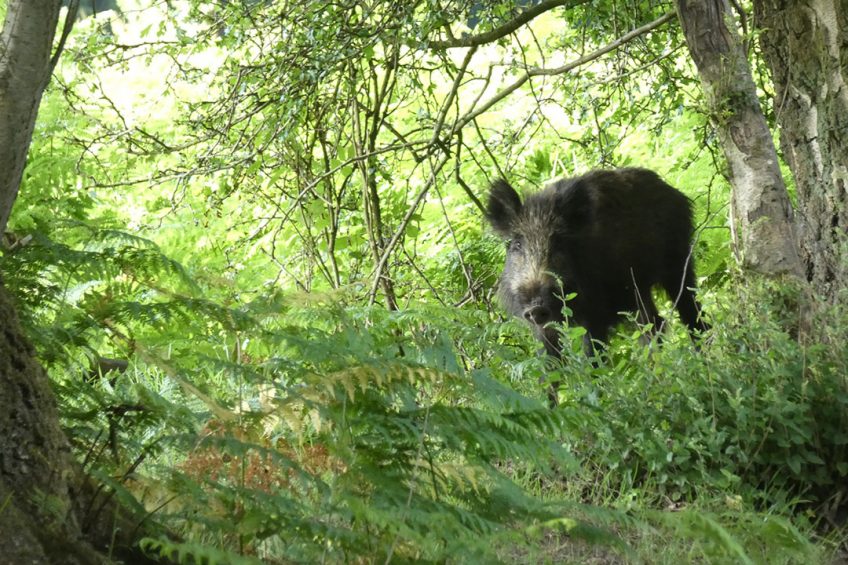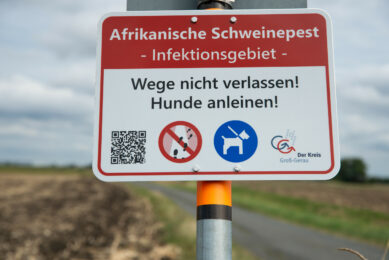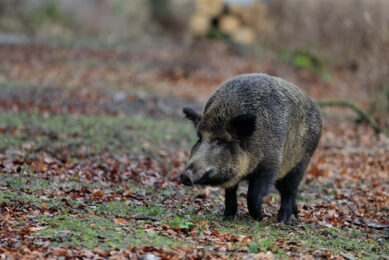ASF Germany: Fight is intensified; 32 boar found infected

The German authorities have intensified the fight against the African Swine Fever virus. At the moment in total 32 infected wild boar have been found. In the meantime, Rabobank stated the virus’ presence in Germany may not have strong long-term effects on the markets.
So far, the virus has been established in carcasses of wild boar in 2 border districts: Oder-Spree and Spree-Neisse. Both are located in the east of Brandenburg state, bordering Poland.
According to European regulations, an inner core zone surrounded by a mobile electric fence, as well as an outer risk zone have been established. In the interactive Pig Progress map below, the core zone has been accentuated with a black colour; 29 cases of which the location was known on Friday September 25, have been added to the map.
Dogs and choppers to find dead boar
The German authorities have increased their efforts to contain the virus in the wild boar population as much as possible. Recently, the search has been intensified by the use of specially trained sniffer dogs. These animals were trucked in from other states like Rhineland-Palatinate and Schleswig-Holstein. The dogs will be able to find carcasses but know not to touch them – otherwise the virus might spread unintentionally.

The search is intensified further by the use of helicopters with thermal imaging cameras and drones. Ursula Nonnemacher, Brandenburg state minister for consumer protection, explained the importance of early detection of wild boar carcasses and therefore the risk area has to be completely and systematically searched for wild boar.
The ASF approach is followed closely
Within Germany, the developments are followed critically as well. State secretary for agriculture Beate Kasch has been urging the local authorities to step up the level of coordination when dealing with the ASF outbreaks, Germany’s agricultural title Top Agrar wrote. She emphasised that only a strong and coordinated approach will contain the virus.

She said, “We expect Brandenburg to ensure that the responsible on-site authorities proceed in a coordinated and uniform manner. It is the job of the Brandenburg State Crisis Center to coordinate and control this.”
The German Farmers Association (DBV), however, criticised the Brandenburg state approach. DBV general secretary Bernhard Krüsken told the German Press Agency (DPA): “We have absolutely no understanding when on day X the control measures only start with a delay and that several crisis teams work side by side without a uniform line.”
Rabobank: Optimism about meat exports
Taking things to an international level, Rabobank has stated to be optimistic about the longer-term disturbances for the pig meat market, in a first analysis of the ASF situation in Germany. The bank stated that effects may not be as severe as anticipated.
According to Rabobank, much depends on the question whether or not countries outside the EU will accept regionalisation. In other words, whether or not they are happy to continue importing from German areas outside the infected zone. Within the EU, regionalisation is also being applied. So far, trade partners like China, Japan, South Korea, Brazil, Argentina, Mexico and the Philippines have closed their borders to pig meat from Germany. Should those countries copy the EU regionalisation approach, then the effect of ASF on Germany might remain limited.

Track the movement of African Swine Fever
For everything you need to know about ASF, from the latest outbreaks to controls stay up to-date…
Rabobank’s optimism is partly based on the fact that the infections have not come entirely as a surprise. Germany was prepared, the bank stated, and if the country proves to have the virus under control and lock down the infected areas, trade partners will be open for regionalisation, according to the bank.
Total German pig meat production
The bank does not expect the total German pig meat production to shrink – and the trade in both piglets and finisher pigs would not be influenced strongly. First of all, however, the uncertainty in the market needs to be taken away.
However, should the countries outside the EU continue to support their import bans, then the trade balance will be disturbed to a larger degree, Rabobank stated. After the USA, Spain and Canada, Germany is the world’s largest pig meat exporter. Rabobank does not see any other country that could fill Germany’s space on the short term.

Read more about pig health in the Pig Progress health tool
Especially exports to China are large. In the first 7 months of 2020, 27% of all German pork exports went to China, an amount that is just below 500,000 tonnes. One-third of that volume is fats and by-products, which are difficult to sell inside Europe.

Support for pork producers during ASF
German pig farmers can count on federal support to cope with the effects of ASF. After all, German pork demand dropped as many countries outside the European Union have banned imports of pork. The measures include subsidies for private storage of meat that cannot be sold.
Germany’s federal agriculture minister Julia Klöckner made those promises in parliament. In case the option of meat storage will be used, the authorities shall wait for the right moment – when sufficient storage space is available. Klöckner said, “We shall not leave the producers alone in this exceptional situation.”

EU commissioner: ASF is European problem
On a European level, the developments in Germany are viewed closely as well. Agricultural commissioner Janusz Wojchiechowski commented that ASF is a European problem, not only of the countries concerned. He said that the EU will do anything it takes to prevent the blocking of imports of pig meat from Europe. He said, “They cannot ban imports from all states.”
He added that the ASF outbreaks have placed additional focus on the pig industry in Europe, which is under a lot of pressure, he added. He referred to European statistics saying that the number of pig producers is coming down – predominantly small farmers disappear these days. “We have to think about how to stop the spread of ASF to better protect our pig producers.” The major risk, he said, would be with larger farms. He mentioned that pig production increasingly is a matter of a “small amount of huge farms.” He said that that wasn’t a correct solution and called it a large problem for the EU.











